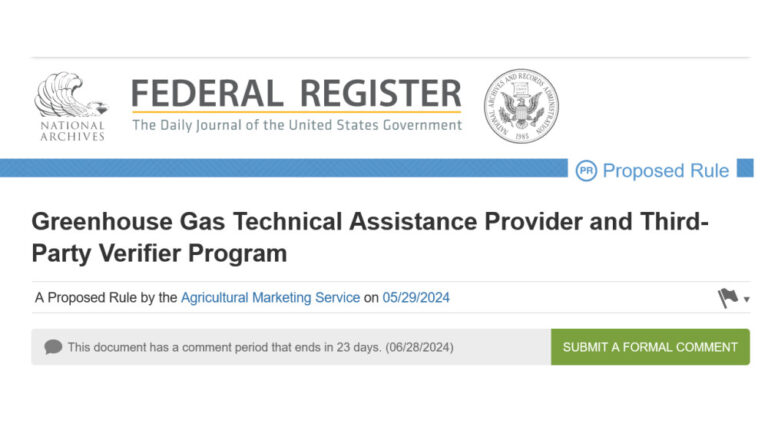Facilitating the participation of farmers, ranchers and private forest landowners in voluntary carbon markets
The USDA Agricultural Marketing Service asks the agricultural community to weigh in on a new program aimed at the voluntary carbon market in the US (Federal Register)
COLUMBUS, Ohio – The U.S. Department of Agriculture Agricultural Marketing Service (USDA) is asking the agricultural community to weigh in on a new program focused on the U.S. voluntary carbon market. The agency has published a report Request for information seeking input on what the agency should consider when developing rules for the new “Greenhouse gas technical assistance provider and external verification program.”
The purpose of the new program created by the passage of the Growing Climate Solutions Act last year is intended to facilitate the participation of farmers, ranchers, and private forest landowners in voluntary carbon markets by: (1) publishing a list of generally accepted protocols designed to ensure consistency, reliability, effectiveness, efficiency, and transparency of voluntary credit markets to guarantee; (2) publishing descriptions of generally accepted qualifications held by covered entities that provide technical assistance to farmers, ranchers, and private forest landowners; (3) publishing a list of qualified technical assistance providers and external verifiers; and (4) providing information to help farmers, ranchers, and private forest landowners access voluntary credit markets.
Farmers have not yet engaged in the voluntary carbon market to the extent that some predicted several years ago, when “carbon deals” began circulating through the farming community. A carbon deal is a private contract that compensates a farmer for adopting practices that capture carbon, with one tonne of captured carbon creating a “carbon credit.” Those who pay farmers for the carbon credits can keep the credits or trade the credits through a carbon market. The owner of the carbon credits can use the credits to offset their greenhouse gas emissions, with the aim of reducing their ‘carbon footprint’.
According to USDA Secretary Vilsack, “High integrity voluntary carbon markets offer a promising tool to create new revenue streams for producers and achieve greenhouse gas reductions in the agriculture and forestry sectors. However, a variety of barriers have hindered agriculture’s participation in voluntary carbon markets and we are working to change that by establishing a new greenhouse gas technical assistance provider and a third-party verification program.” In its request for information, the agency seeks answers to eight questions:
Question 1: How should USDA define the terms “consistency,” “reliability,” “effectiveness,” “efficiency,” and “transparency” (see 7 USC 6712(c)(1)(A)) for use in protocol evaluation?
Question 2: What metrics or standards should USDA use to evaluate a protocol’s alignment with each of the five criteria to be defined in Question 1? What should USDA consider as minimum criteria for a protocol to be eligible for inclusion under the Program?
Question 3: In general, how long does it take for a project to use the protocol and receive credits after a new protocol is published? i.e, what is the lag time between the publication of the protocol and the first credit generation)?
Question 4: What protocol(s) for generating voluntary carbon credits from agricultural and forestry projects should USDA evaluate for inclusion through the Greenhouse Gas Technical Assistance Provider and Third-Party Verifier Program?
Question 5: Additional information for all protocol(s) identified under question 4.
Question 6: How should USDA evaluate technical assistance (TAP) providers? What must be the minimum qualifications, certifications and/or expertise for a TAP to be eligible for inclusion under the Program?
Question 7: Should the qualification and/or registration process be different for entities and individuals wishing to register as TAP?
Question 8: What must be the minimum qualifications and expertise for a third-party verifier to be eligible for registration under the program?
The agency will accept responses to the questions until June 28, 2024.
Part of a broader policy initiative
USDA announced the request for information on the same day Secretary Vilsack, Energy Secretary Granholm and Treasury Secretary Yellen released a report. Joint Policy Statement and Principles for Voluntary Carbon Marketswhich outlines seven principles for the government’s approach to promoting “high integrity voluntary credit markets”, summarized in a Facts about the White HouseT:
- Carbon credits and the activities that generate them must meet credible atmospheric integrity standards and represent true decarbonization.
- Credit-generating activities should avoid environmental and social harm and, where appropriate, support co-benefits and transparent and inclusive benefit sharing.
- Business buyers using credits must prioritize measurable emissions reductions within their own value chains.
- Credit users must disclose the nature of credits purchased and withdrawn.
- Public claims from credit users must accurately reflect the climate impact of retired credits and must only rely on credits that meet high integrity standards.
- Market participants should contribute to efforts that improve market integrity.
- Policymakers and market participants should facilitate efficient market participation and try to reduce transaction costs.
The recent USDA announcements once again suggest that there are many problems for farmers considering entering the carbon market. Caution is generally advised when dealing with a new, developing market. For farmers looking to enter the carbon market, see our posts at Carbon as a raw material for agriculture? And Are you considering carbon farming? Take the time to understand the carbon deals. The Farmers Legal Action Group also has an excellent publication about it Farmer’s Guide to Carbon Market Contracts in Minnesotaalso useful for Ohio farmers.
— Peggy Kirk Hall, attorney and director of the Agricultural and Resources Law Program
Ohio State University CFAES


